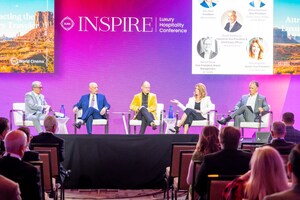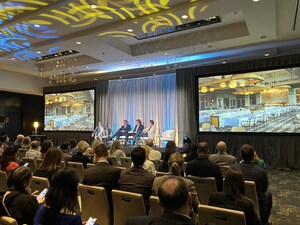Report back: Traveler Trends and Drivers of Behavior post-COVID-19
The International Luxury Hotel Association's NorthEast Chapter continues with its webinar series on the recovery of luxury hotels
PALM BEACH, Fla., June 11, 2020 /PRNewswire/ -- The webinar on Traveler Trends and Drivers of Behavior post-COVID-19 was moderated by Anna Domingo, Founder, PADZZLE Marketing Strategies, and joined by panelists, Jerry Henry, Chief Executive Officer, H2R Market Research, Dr. Brent Smith, Professor of Marketing / Chairperson, Department of Marketing Communication, Emerson College and Joni Newkirk, CEO, Integrated Insight, Inc.
Short term outlook
All the panelists agreed that for the near future travelers are going to be cautious and stay closer to home, preferably in less dense, more rural, outdoor orientated destinations. Jerry mentioned that during times of adversity people get very conservative, which translates into shorter trips, closer to home where people have more confidence. They also tend to be more price-sensitive. Brent added that people traveling with a radius in mind will want a destination where there is a lot to do when they arrive but will consider how easy it is to get home should something happen. Travelers will also take private, charted, or red-eye flights so they can secure their entry at a less congested time.
Long term outlook
There will be a lingering obsession with cleanliness, even with a vaccine, and hotels will need to make guests feel comfortable with any changes around touchless technology, temperature checks and sanitation practices. Brent spoke about borrowing a page from Disney's book, allowing guests to make an appointment to use a popular ride, visit a great pool or view a private Japanese garden.
Check-in still has some pain points. Operators should examine integrating smarter technologies into the guest experience as travelers are trying to minimize touching things other people may have touched. Can you remove some front desk components? Can guests check-in using their phone? Keyless entry? International travel, conventions, and anything risky will take longer to recover.
Hygiene is a high priority
Guests will want to know what changes hotels have made, the most popular being to limit capacity in common areas, sanitize surfaces, do temperature checks where necessary and have attentive staff. People are wanting to be well taken care of and will notice the attitude of hotel management and how their employees are treated. Joni highlighted the cruise industry model where high traffic areas are cleaned during the day in front of guests, but said that expectations with luxury properties are that you have always been doing this, it is what distinguishes the different pricing tiers. She added that the prime marketing message should be more about why you want to get out and why the destination is so attractive. Hygiene best practices should be communicated on the property website or in more subtle ways. Brent suggested that hotels should let the consumer know what they will be doing and when it is done, for example, leave a sign or brief note saying "this is what we did while you were away."
"More consumers today care about how things are made, and this provides opportunities for differentiation where it maps onto the luxury tier," said Brent. "Hygiene and sanitation are the reminder as to why you have always trusted us. Let guests know that we have always taken care of you and we want you to rest assured we have been preparing for moments like this and we will be ready for moments beyond this one."
Age demographics vs. psychographics
Everyone has a high level of concern about themselves, their friends and family, and the economy. "We are truly in this all together," said Jerry. "But if you do want to break it out by generational cohort the older the traveler, the more the concern." Early adopters tend to be younger, though there is a good percentage of 55+ who love multi-generational travel or trips with friends and will not be held back.
It is important to ask your guests if they are ready to get back out. You need to understand how your guests are feeling and where they are on that curve.
The pricing environment
"There is not much difference when you compare high end vs. low end regarding the virus, statistically," said Jerry, " where there is popularity is in governance, where best practices include wearing masks, using sanitizer, and washing hands. The message is more about value, but we are seeing in surveys that price does motivate the consumer. This goes back to being more cautious, staying regional and these people tend to be more price-sensitive. High-income people will also be more value-sensitive as the concern they are feeling is that if the experience changes and is somewhat restricted, the overall experience is reduced but the price remains the same. There is an opportunity here to give them innovative experiences that are special while still following social distancing guidelines that will help that value equation seem more palatable. I think this is a near term issue," he added.
Joni warned against the luxury sector discounting their product, as it takes so much to come back once you have done so. "The message should focus on why people know and love you in the first place and choose you rather than another option. I do not feel that this is a price game, people generally feel the value is there in a luxury hotel. COVID-19 has not changed your value proposition, this is about external events that are preventing potential guests from traveling."
The role of reviews post-COVID-19
"I have mixed feelings about reviews, said Brent, "what people are generally looking for in reviews they tend to find. Hygiene will be a priority, people will be scrolling for reviews linked to hygiene and mental comfort around it. If I read a few reviews that mention hygiene and are not positive, I'll probably pass on the property. In terms of experiences, it will be more about word of mouth. What we have learned from Disney is to set up Wi-Fi to encourage people to take pictures and share them. We are a generation of storytellers. Let your consumers share their story and allow them to join in creating your story. It is a co-created value proposition. You have an idea of what your offering is, but your consumer knows more about what they value, and there are other people just like them, who can articulate, receive such repeat your messaging. They can become your brand champions, your influencers, your shepherds. You can also use something like Brandwatch or Mention to see what is getting traction, they are very inexpensive social media tools that will give you feedback very quickly," Brent continued.
Psychological factor – do big brands make consumers feel more confident?
From a consumer standpoint, people are concerned about the rate of infections. Hotels are tied to travel, to the economy and confidence, so we need to see the numbers coming down before people will start venturing out. "As far as brand awareness, some chose to play possum and some chose to stay out there and I think the latter will come back quicker," said Jerry.
According to Brent, large brands with a strong international presence, should form partnerships with their tourism bureau, regional airline, hotel association, or theme park so that they can create an experience for the consumer and commit to getting them there and getting them out if necessary. On the smaller front, have partnerships that you can manage with smaller towns, local, independent eateries, lakes and let your message be about how your offerings can provide days of fun and activity. Remind past guests that you are a part of our family and we will treat you as one of the family and keep you safe.
"Through all of this we are still human," said Brent, "we have not changed. Attitude is long-term. We are variety seeking, that is part of who we are. Culture will always matter, being in the presence of other people means something, so we have taken this corrective, safe action for a while, but we are not going to be comfortable staying here, we are high contact people, we will find a way to do things together. "
This webinar was sponsored by Metropolitan Tea, a vertically integrated tea manufacturer managing 1000+ ingredients imported from 35 countries. Their team of tea masters has 250+ years of combined tea expertise with a couple of members now in their fifth decade trading tea. Their key experiential tea solution for the luxury hospitality industry is known as Metz Luxury Tea.
Join the next webinar on Luxury Hotel Operations and Facility Protocols following COVID-19, June 17, 4:00 PM EST, with Jessica Hahr, Senior Project Manager, Lehrer Cumming as moderator and panelists Greg Bingaman, Director Asset Management, Westmont Hospitality Group, Stan Kozlowski, Owner, CooperWynn and Andrea Torrance, Senior Vice President, Guest Experience, North & Central America at Accor.
About the International Luxury Hotel Association
The International Luxury Hotel Association is luxury hospitality's preeminent association promoting, unifying and advancing the industry through insight, opinion, and research. ILHA reaches an audience of more than 500,000 hotel professionals in 90+ countries and produces LUXURY HOTELIERS Magazine, ILHA SmartBrief and the INSPIRE SUMMITS in Europe and North America. They also run LinkedIn's largest hospitality and travel group, which ranks in the top 100 of the more than 10 million professional groups on LinkedIn. Connect with us on luxuryhotelassociation.org, hospitality and travel forum, ILHA Facebook, ILHA Instagram, ILHA Twitter, ILHA YouTube
CONTACT: Sharon Hirschowitz, [email protected]
SOURCE International Luxury Hotel Association

Related Links
WANT YOUR COMPANY'S NEWS FEATURED ON PRNEWSWIRE.COM?
Newsrooms &
Influencers
Digital Media
Outlets
Journalists
Opted In





Share this article